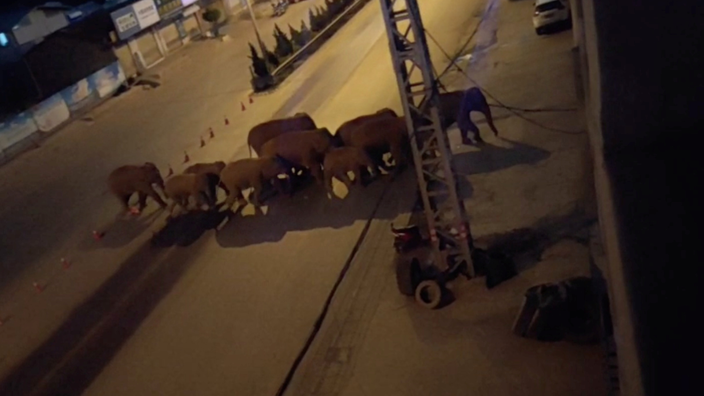"Fifteen elephants, which swayed, on a web, web, spider's web ..."
No one knows if the joyful patrol of these Asian elephants who fled their reserve to travel 500 kilometers hums, in its own jargon , this childish rhyme.
In any case, these fifteen pachyderms have indeed been shaking the web of the global Internet for several weeks.
The affair, to be honest, is not trivial: scientists are struggling to explain with certainty the causes of this exodus, and the animals are doing great damage in their path.
Read also: In the Democratic Republic of the Congo, the great return of elephants
It all started in March, when 17 elephants, including three baby elephants, suddenly left their Mengyangzi reserve, in the autonomous prefecture of Xishuangbanna, deep in Yunnan province - a border region between Laos and Burma.
“They started to leave the nature reserve and head north in March 2020 and arrived in Mojiang County
.
This is where a baby elephant was born, in December. They stayed there for four months. Then the herd resumed its journey north in April ”
, tells the
World
Becky Shu Chen, a consultant from the Zoological Society of London, who works with Ahimsa Campos-Arceiz, elephant specialist in the Xishuangbanna reserve.
Two elephants then turn back, leaving the 15 remaining runaways to continue their journey. Hundreds of kilometers later, a new pause is necessary: since Wednesday, June 3, the herd has been prowling in the outskirts of the metropolis of Kunming, the capital of Yunnan province, which has several million inhabitants.
In recent weeks, this funny soap opera has stirred passions on Chinese social networks,
reports the South China Morning Post
:
"They probably want to attend the meeting of the United Nations Conference on Biodiversity in Kunmnig
", laughs a surfer on the social network Weibo, reports the
South China Morning Post
.
"Knock knock, is anyone there?" I want to eat a banana, or an apple, or an orange will do, ”
commented another referring to a video capturing one of the elephants“ knocking ”on a villager's door with its trunk. In
Le Monde
, Becky Shu Chen adds that the population has given the troop a nickname:
“They call it 'little broken nose'
[小 断 鼻, in Chinese, keyword used on Weibo to designate them]
, because one of the baby elephants lost part of its trunk.
"
Image from a video from the Weibo social network Weibo
Problem: in their mop, the animals have done a lot of damage.
Chinese national television broadcast images of the herd crossing entire cities at night, stationing on major roads or sacking corn fields.
During the last week of May, the elephants emptied a water tank and a farm's grain reserves, according to television, which estimates the damage since the start of their journey at 6.8 million yuan (870,000 euros ), with 56 hectares of crops destroyed.
Image from the Weibo social network Weibo
Several hypotheses
Zoologists do not understand what caused the herd to leave their reserve for such a long distance. We know, however, that pachyderms have tended in recent years to move closer to villages, while the plants they usually eat are replaced by inedible species. Asian elephants are considered an endangered species and protected as such in China, with a population estimated at 300 heads, compared to less than 200 in the 1980s. They live in huge reserves in which they roam freely, in search of food and according to the seasons.
In
Le Monde
, Becky Shu Chen puts forward this hypothesis:
"(...) the increase in deforestation since the 1980s, to make way for agricultural land and mainly rubber plantations, has led to a reduction and fragmentation. of their domain.
Now they move through populated agricultural areas ”.
For the researcher, elephants have adapted to this evolution of their environment:
“The extension of agricultural land and plantations on their territory is equivalent, for them, to the discovery of an immense confectionery in which they know they are going. find huge amounts of easily accessible food.
"
Drones and truck barriers
This peregrination is now closely monitored by the inhabitants and the authorities, equipped with drones in order to avoid any risk for the population.
In an attempt to channel them, the authorities are trying to entice them with food and block roads with trucks.
On Sunday, the public channel CCTV broadcast images of a convoy of trucks parked along a small country road in an attempt to drive the herd away from densely populated areas.
CCTV footage from the weekend also showed the pachyderms casually strolling through the streets of a village, leaving flattened trees and damaged garage doors behind.
Elephants advance on a road in Eshan, Yunan province, China, May 27, 2021. The image is from a video from a social network.
ESHAN COUNTY FANG YUAN CAR CARE / REUTERS
"I was scared,"
a local resident told CCTV, saying that she had come across an elephant
"about three meters high".
"A baby elephant even ran into our wall, before fleeing,"
said the elderly lady, whose name has not been released.
A baby elephant on a road in Eshan, Yunan province, China, May 27, 2021. The image is from a video from a social network.
ESHAN COUNTY FANG YUAN CAR CARE / REUTERS

